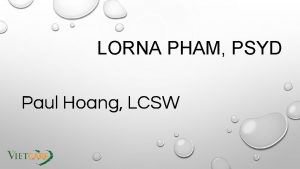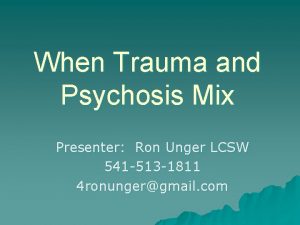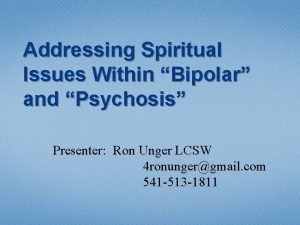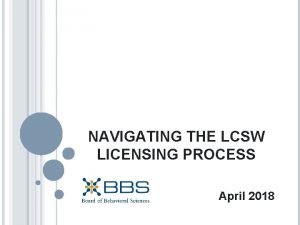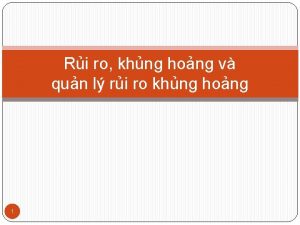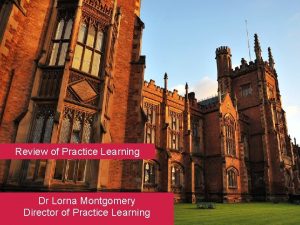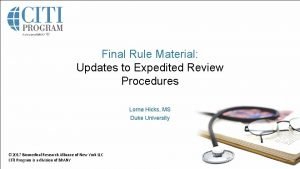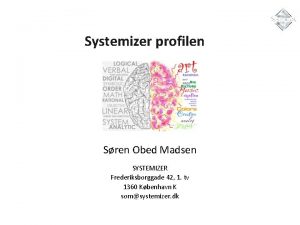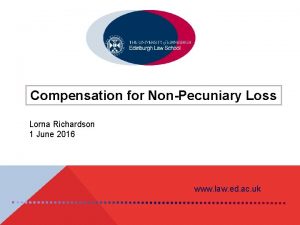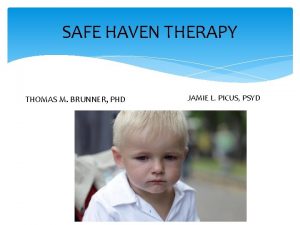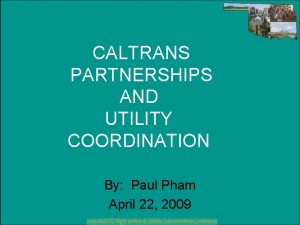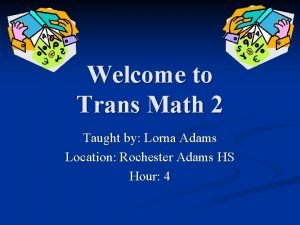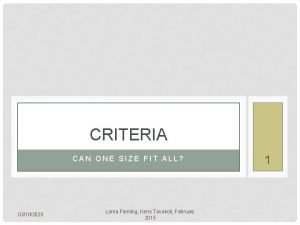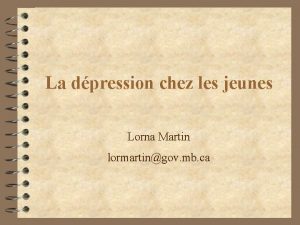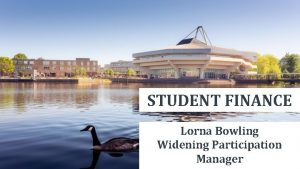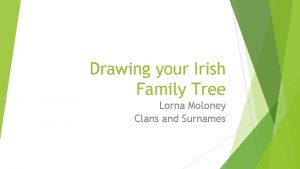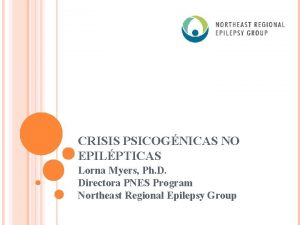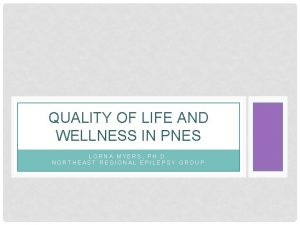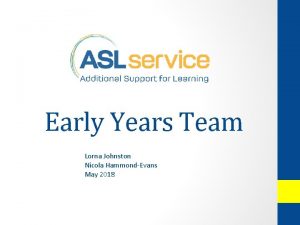LORNA PHAM PSYD Paul Hoang LCSW Paul Hoang



























- Slides: 27

LORNA PHAM, PSYD Paul Hoang, LCSW

Paul Hoang, LCSW ü Gender: ü Male ü Homosexual ü Heterosexual ü Ethnicity: Lorna Pham, Psy. D ü Bisexual ü Transgender ü Vietnamese ü Female ü Heterosexual ü Filipino ü Ethnicity: ü Vietnamese-American ü Profession: ü Transgender ü Vietnamese ü Profession: ü Assimilated ü Filipina ü Clinical Psychologist ü Cultural Status: ü Acculturated ü Assimilated ü Acculturated ü Language Proficiency: ü Bilingual ü Bisexual ü Filipina-American ü Clinical Social Worker ü Cultural Status: ü Homosexual ü Language Proficiency: ü Monolingual ü Trilingual ? Passion ? Personality ü Bilingual ü Monolingual ? Religion/ Spirituality ü Trilingual

MENTAL HEALTH EMPOWERMENT THROUGH CULTURAL HUMILITY PAUL HOANG, LCSW & LORNA PHAM, PSYD MARCH 16, 2017

Welcome! Lorna Pham, Psy. D; Executive Director of Viet-CARE 1. 5 Generation Filipino American Paul Hoang, LCSW, President of Viet-CARE 1. 5 Generation Vietnamese-American Viet-CARE (Community Action for Resources & Empowerment

Cultural Background: Filipino Americans • Filipino Americans represent the second largest Asian American group in the United States (US Census Bureau, 2010). Roughly around 3. 5 million. • California alone has 1. 5 million • First filipino settler in San Francisco Bay area during the mid-19 th century. • Roughly about 464, 000 living in SF, with largest concentration in Santa Clara County, followed by San Jose, and Daly city. • More than half are living in West Coast and Hawaii. • Only AA that have been placed into several ethnic categories (AA, PI, Hispanics, or Filipino). • Mostly Catholics, with some Muslim and Christians.

Cultural Background: Vietnamese Americans • Relatively recent migrant group (mostly first or second-generation) • As refugees Vietnamese Americans have the highest naturalization rates in the country (76% of foreign born Vietnamese Americans are naturalized citizens compared to 67% of people from other Southeast Asian). • 4 th largest Asian American population in the United States. • California and Texas have the highest concentration of Vietnamese American. • In California, Orange County (184, 153), Los Angeles, and Santa Clara counties

Mental Health: • Vietnamese Americans: PTSD, MDD, adjustment disorder, somatization, panic attacks, schizophrenia, and GAD. 5 • 40% of the children of resettled refugees experienced an increase in conduct and oppositional defiant disorders • Filipino Americans adolescents have the highest rate of reported depressive symptoms and suicide ideations (President’s Advisory Commission on AAPI, 2001). • Low suicide rate may be due to strong influence of the Catholic Church. • Lower levels of self-esteem and higher levels of depression than other ethnic groups.

Substance Abuse API

Alcohol API: Estimated Prevalence of Alcohol use in the US (1998 data), past-month. Age group: 12 -17 (10. 5), 18 -25 (44. 0), 26 -34 (37. 5), 35+ (36. 7) Gender: Male (39. 9), Female (29. 2)

Barriers for seeking treatment Lack of Resources Stigma NIMBY Cultural appropriateness Lack of education Language Lack family support Cultural beliefs

Another group exercise…. . . What are some of your biases regarding mental health and substance? What are some of the stereotypes surrounding Asian Americans, specifically Filipino and Vietnamese Americans?

What can we do?

RECAP

RECAP Mental Health Empowerment Cultural Humility


Community Action ❑ Assessment: ❑ Needs ❑ Available resources Resources & Empowerment Compassion Education Collaboration



Culture How many Asian are there living in the United States

Culture = Collaboration Customs Values Talents/ Resources Purpose Development process


Cultural Humility • Shift in Attitudes and Mindset • Cultural Competency = Knowledge acquisition • Cultural Sensitivity = Awareness of others • Cultural Humility = Awareness of Self • Practice Mindfulness Connection • Meaningful dialogues and times spent with others • Self-reflection/ self-examination regularly

Cultural Sensitivity & Humility




THANK YOU 5. Davis RE, Kennedy MG, Austin W. Refugee Experiences and Southeast Asian Women’s Mental Health. Western Journal of Nursing Research. 2000; 22. 2: 144 -168. 9. Chu JP, Sue S. Asian American Mental Health: What we KNow and What we Don’t know. Online Readings in Psychology and Culture. 2011; 3. 1. Edman, J. L. , Andrade, N. N. , Glipa, J. , Danko, G. P. , Yates, A. , Johnson, R. C. , Mc Dermont (1998). Depressive symptoms among Filipino American adolescents. Cultural Diversity and Mental Health 4(1), 45 -54. The Asian Population: 2010. Washington DC: U. S. Bureau of the Census. Retrieved from http: //www. census. gov/prod/cen 2010/briefs/c 2010 br-11. pdf
 Lorna pham
Lorna pham Tính mô phạm trong giao tiếp sư phạm
Tính mô phạm trong giao tiếp sư phạm Nena kircher psyd
Nena kircher psyd Abnormal psychology ucf
Abnormal psychology ucf Ron unger lcsw
Ron unger lcsw Ron unger lcsw
Ron unger lcsw Dr julie larson
Dr julie larson Julie larson lcsw
Julie larson lcsw Bbs lcsw forms
Bbs lcsw forms Alison franklin lcsw
Alison franklin lcsw Dãy hoàng liên sơn
Dãy hoàng liên sơn Bạch nhật y sơn tận
Bạch nhật y sơn tận Dãy núi nào cao và đồ sộ nhất việt nam
Dãy núi nào cao và đồ sộ nhất việt nam Mẹ đứng đó khi hoàng hôn tím màu
Mẹ đứng đó khi hoàng hôn tím màu Quản trị rủi ro và khủng hoảng
Quản trị rủi ro và khủng hoảng Kìa trông huy hoàng vì sao
Kìa trông huy hoàng vì sao Ta hãy khẩn cầu cho đức giáo hoàng
Ta hãy khẩn cầu cho đức giáo hoàng đây là nước nào
đây là nước nào Dr lorna martin
Dr lorna martin Lorna fish
Lorna fish Lorna simpson
Lorna simpson Lorna maden
Lorna maden Lorna ramsay
Lorna ramsay Lorna hicks duke
Lorna hicks duke A formal, equilateral triangular design.
A formal, equilateral triangular design. Kate gilmore
Kate gilmore Frederiksborggade 42
Frederiksborggade 42 Lorna richardson
Lorna richardson
